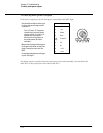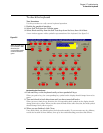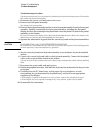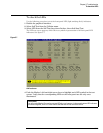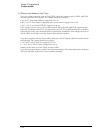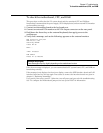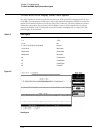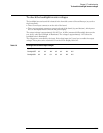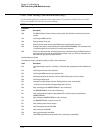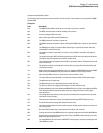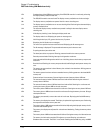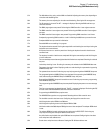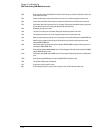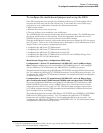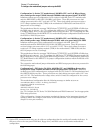
Chapter 5: Troubleshooting
POST Code Listing (AMI Motherboard only)
5–24
POST Code Listing (AMI Motherboard only)
Use the following listing to troubleshoot the motherboard. You will need a POST (Power-On Self
Test) card installed in an ISA slot to use this listing.
POST Code Listing
Checkpoint
Code Description
D0h The NMI is disabled. Power on delay is starting. Next, the initialization code checksum will be
verified.
D1h Initializing the DMA controller.
D3h Starting memory sizing next.
D4h Returning to real mode. Executing any OEM patches and setting the stack next.
D5h Passing control to the uncompressed code in shadow RAM at E000:0000h. The initialization code
is copied to segment 0 and control will be transferred to segment 0.
D6h Control is in segment 0. Next, checking if Home was pressed and verifying the BIOS checksum. If
either Home was pressed or the system BIOS checksum is bad, next will go to checkpoint code
E0h. Otherwise, going to checkpoint code D7h.
Bootblock Recovery Codes
The bootblock recovery checkpoint codes are listed in order of execution:
Code Description
E0h The onboard floppy controller, if available, is initialized. Next, beginning the base 512 KB memory
test.
E1h Initializing the interrupt vector table next.
E2h Initializing the DMA and Interrupt controllers next.
E6h Enabling the floppy drive controller and Timer IRQs. Enabling internal cache memory.
EDh Initializing the floppy drive.
EEh Looking for a floppy diskette in drive A:. Reading the first sector of the diskette.
EFh A read error occurred while reading the floppy disk in drive A:.
E0h Next, searching for the AMIBOOT.ROM file in the root directory.
F1h The AMIBOOT.ROM file is not in the root directory.
F2h Next, reading and analyzing the floppy diskette FAT to find the clusters occupied by the
AMIBOOT.ROM file.
F3h Next, reading the AMIBOOT.ROM file, cluster by cluster.
F4h The AMIBOOT.ROM file is not the correct size.
F5h Next, disabling internal cache memory.
FBh Next, detecting the type of flash ROM.
FCh Next, erasing the flash ROM.
FDh Next, programming the flash ROM.
FFh Flash ROM programming was successful. Next, restarting the system BIOS.



